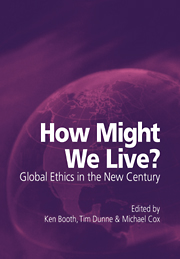Book contents
- Frontmatter
- Contents
- Notes on Contributors
- Acknowledgements
- Foreword
- Introduction: How Might We Live? Global Ethics in a New Century
- Individualism and the Concept of Gaia
- Bounded and Cosmopolitan Justice
- Globalization From Above: Actualizing The Ideal Through Law
- A More Perfect Union? The Liberal Peace and the Challenge of Globalization
- International Pluralism and the Rule of Law
- Towards a Feminist International Ethics
- Contested Globalization: The Changing Context and Normative Challenges
- Universalism and Difference in Discourses of Race
- Does Cosmopolitan Thinking Have a Future?
- Individuals, Communities and Human Rights
- Thinking About Civilizations
- Index
A More Perfect Union? The Liberal Peace and the Challenge of Globalization
Published online by Cambridge University Press: 04 August 2010
- Frontmatter
- Contents
- Notes on Contributors
- Acknowledgements
- Foreword
- Introduction: How Might We Live? Global Ethics in a New Century
- Individualism and the Concept of Gaia
- Bounded and Cosmopolitan Justice
- Globalization From Above: Actualizing The Ideal Through Law
- A More Perfect Union? The Liberal Peace and the Challenge of Globalization
- International Pluralism and the Rule of Law
- Towards a Feminist International Ethics
- Contested Globalization: The Changing Context and Normative Challenges
- Universalism and Difference in Discourses of Race
- Does Cosmopolitan Thinking Have a Future?
- Individuals, Communities and Human Rights
- Thinking About Civilizations
- Index
Summary
Global democratization rose to the international agenda in the past year as the three peak global economic associations all came under attack. In Seattle, at the meeting of the new World Trade Organization, and in Washington at the meetings of the World Bank and the International Monetary Fund, a diverse collection of labour unions and environmentalists from the industrial North and trade and finance ministers from the developing countries of the South each launched sharply critical barbs. The critics successfully disrupted the WTO meeting that had been designed to launch (and celebrate) a ‘Millennium Round’ of further reductions of barriers to global trade. The aims of the critics were very different, but together they derailed the entire proceedings and exposed important differences in priority among the developed states, and particularly the US and Europe. Charlene Barshefsky, the US Trade Representative and the meeting's chair, later conceded, ‘We needed a process which had a greater degree of internal transparency and inclusion to accommodate a larger and more diverse membership’. This highly-regarded trade-o-crat had come to recognize that the eminently oligarchic WTO needed some democratization (as yet undefined).
Joe Stiglitz, until recently the chief economist of the World Bank, offered a still broader criticism of the Bank's sister institution, the International Monetary Fund. The IMF was designed to rescue countries in temporary balance of payments difficulties.
- Type
- Chapter
- Information
- How Might We Live? Global Ethics in the New Century , pp. 81 - 94Publisher: Cambridge University PressPrint publication year: 2001
- 1
- Cited by



